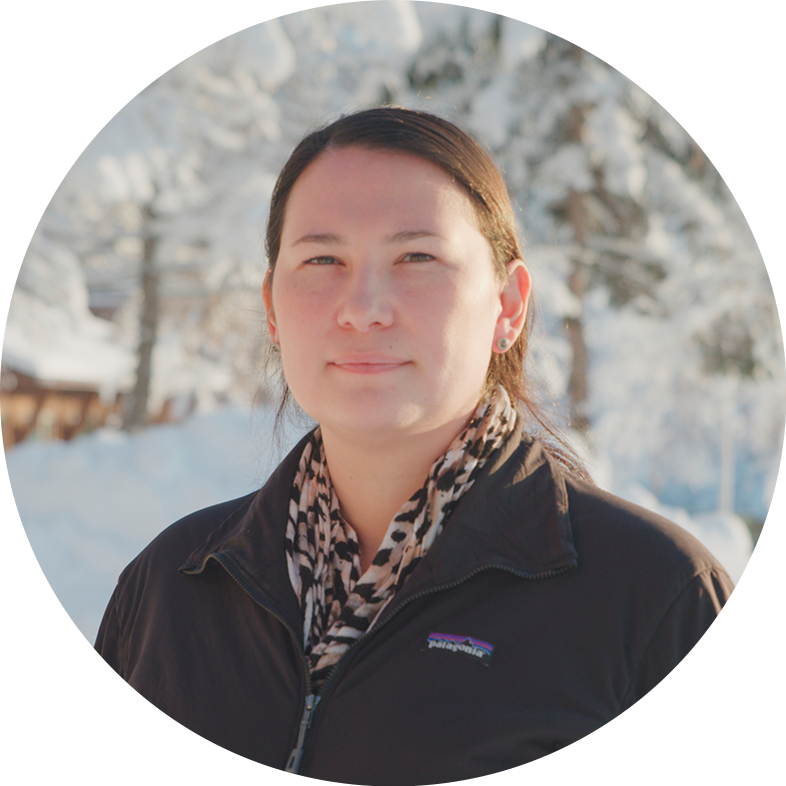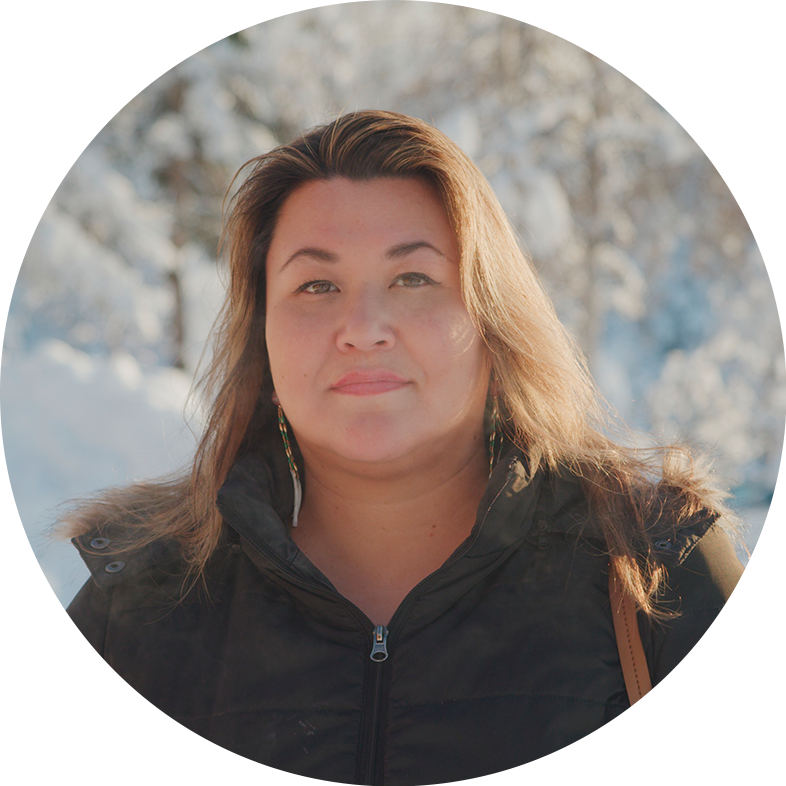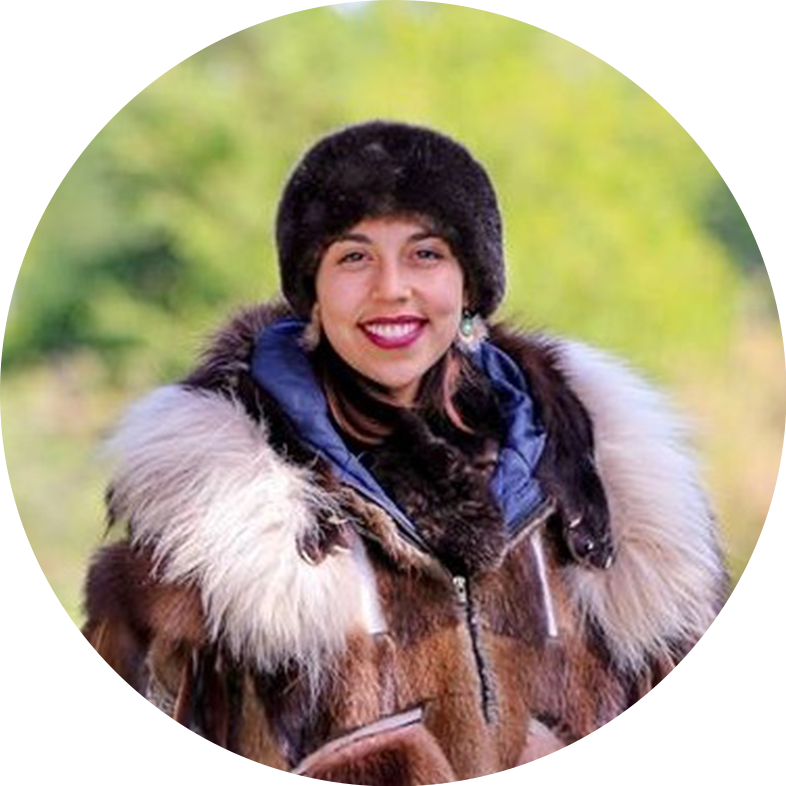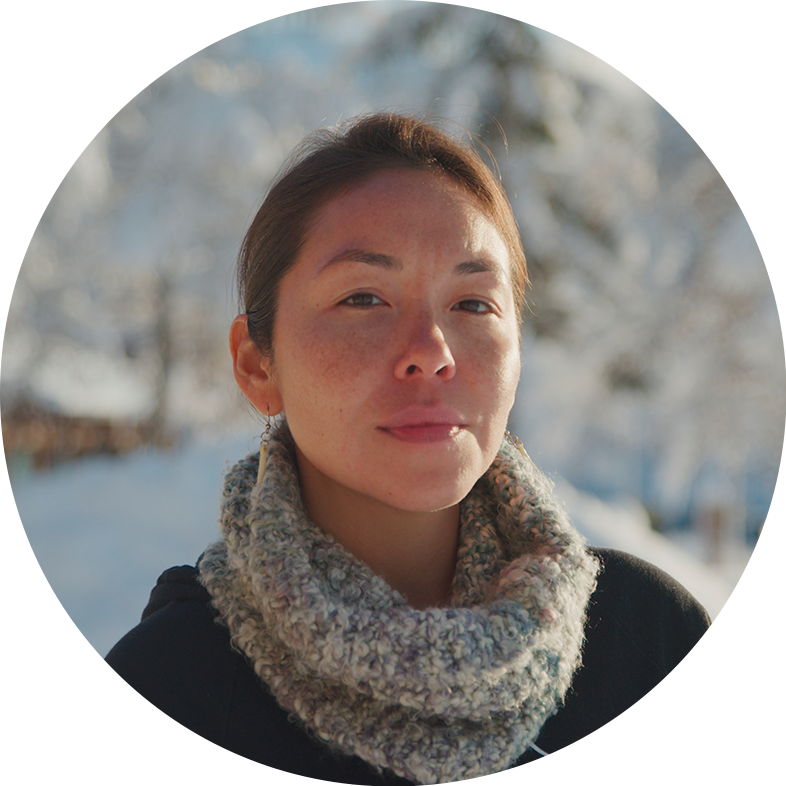
Uvuŋa atiġa Iñuraaq. Sitñasuakaġamuiruġa. Kiġiktaqamui-lu Katyaakamui-lu illutka. Mamaġa Aaġayuk. Papaġa Keok. Aanaġa Iñuraaq and Maktoya. Taataġa Robert. My name is Iñuraaq Kaylene Evans. I am an Iñupiaq from Sitñasuak (Nome), Alaska. I am the daughter of Bobby Evans of Sitñasuak and Kathleen Jaycox of Katyaak. I am the granddaughter to the late Laura Maktuaya (Sockpick) Evans of Kiġiktaq, Bob Evans of Minnesota, and the late Myrtle Iñuraaq Wells of Katyaak. Upon receiving my MA in Indigenous Politics from the University of Hawaiʻi, Mānoa, I have returned to Alaska to more deeply connect to my community, nuna, and traditions. I am a poet, retracing Iñupiat creative traditions. I am passionate about individual and collective healing through the rejection of colonial ideologies and lifestyles, and a return to our languages, homelands, and subsistence values.
For Utuayuuruaq; Quyanna Muktoya; We are Our Ancestors Dreams Alive; (C)o(l)on(i)zation and (M)igr(at)ion Chang(e)
My poems are inspired by the resilience and brilliance of Alaskan Native Peoples and our intimate connection to nuna (land). My understanding of subsistence living is imbued in the poems, with the highest recognition of the nuna and the spirituality and discipline necessary to honor our relationships with all life forms. I have dedicated two poems to the most beloved in our culture: our elders and our youth. Quyanna Muktoya honors my paternal grandmother, Laura Muktoya Sockpick Evans, as the matriarch of our family and precious provider of warmth, humor, and expertise. For Utuayuuruaq celebrates my younger sister and the hope and wisdom our next generation gifts us. My two poems, We are Our Ancestors Dreams Alive and (C)o(l)on(i)zation and (M)igr(at)ion Chang(e), reject colonial ideas that situate humans vs. climate change. For Indigenous Peoples, nuna has been our constant companion and provider throughout millennia. The global changes we are witnessing are a translation of the imbalance generated by colonization and globalization and nuna’s reassertion as true power. Indigenous Nations have nothing to fear, as our teachings and language provide clear directions on how to thrive in yet another storm.





“None of us have had to say where our expertise comes from … everyone understands that we are standing on thousands and thousands of years of cultural knowledge about one specific place on this planet and that is so deep. The mutual respect and understanding is already there so you just get to the deeper topics right away. Our approach is very holistic. We can talk about anything from language revitalization, to building an economy, to food security.”
Apapi, AlexAnna, was raised in the Village of Igiugig. A granddaughter of John and Mary Olympic and the second oldest child of Dan and Julia Salmon. In 2008, she graduated from Dartmouth College with a dual Bachelor of Arts degree in Native American Studies and Anthropology. After graduating, she returned to work for the Igiugig Tribal Village Council as President and Program Director. She also serves as a member of the Igiugig Native Corporation board, as well as the Lake and Peninsula Borough Planning Commission, and the subregional health board. She is enrolled in the Department of Alaska Native Studies and Rural Development Master of Arts program at the University of Alaska, Fairbanks.

“Building on top of our Indigenous Knowledge, uplifting that and moving toward sustainable practices and deciding what is good for our land, and what is good for our people, and how can we all do this together … We’re a part of something that is so much bigger than ourselves. We are all creating what this is now so it’s hard to say where this is going to take us but we sure know it’s going to be amazing because it comes from a place of love, and our values, and community, and homelands, and traditions.”
Geh Gii Ch’adzaa, Rochelle, is from the Interior Alaskan villages of Beaver and Fort Yukon. Her parents are Angela Peter-Mayo of Fort Yukon and the late Cliff “Tuffy” Adams Jr. of Beaver. Her maternal grandparents are Susan (Lord) and Johnny Peter Sr. Her paternal grandparents are Hannah “Babe” (VanHatten) and Cliff Adams Sr. She was raised living a traditional Athabascan lifestyle with her family following the seasonal cycles of hunting, fishing and trapping off of the Yukon River. These are the values and connections that guide her today and she proudly represents this in all parts of her life and work. She is the mother of three teens, which she is raising with these same values of connectedness, love and respect. Through her many roles and actions, Rochelle has continuously sought to bring her perspective as an Indigenous woman with cultural knowledge, born of the lands and waters, training from the elders with a vision of the future generations to empower Native people everywhere. “It’s important that we as Indigenous people are able to shape the world that we live in to ensure the well being of our people on our own traditional homelands and in our own languages.

“When we think about a sustainable future, it is about returning to and a reclamation of our values, rather than just a pivot away from them. It is more coming home to our ideas and beliefs that we know are so sacred and inherent to who we are.”
Iñuraaq, Kaylene, is Iñupiaq from Sitñasuak (Nome), Alaska. She is the daughter of Bobby Evans of Sitñasuak and Kathleen Jaycox of Katyaak and the granddaughter to the late Laura (Sockpick) Evans of Kiġiktaq, Bob Evans of Minnesota, and the late Myrtle Wells of Katyaak. Upon receiving her master of arts in Indigenous Politics from the University of Hawaiʻi, Mānoa, she returned to Alaska to strengthen her connection to her community, nuna, and traditions. Iñuraaq is a poet, retracing Iñupiat creative traditions. She is passionate about individual and collective healing through the rejection of colonial ideologies and lifestyles, and a return to Indigenous languages, homelands, and values.

“We can mentor the rest of the world as they try to come up with solutions and come up with a model. We have the model. We have the knowledge of what it means to be in relationship to land and place. We lived in balance and so as the the rest of the world desperately looks for hope and sustainable living, transitions, we as Native people can help unlock that and help articulate and show the rest of the world what we can come back to.”
Akall’eq, Andrea, is a community activist from Bethel, Alaska now living and working on the lands of Kānaka ‘ōiwi (Native Hawaiians). She is a Yup’ik Tribal citizen of the Native Village of Kwinhagak. Andrea serves as the President of Native Peoples Action and as a co-founder of Native Peoples Action Community Fund where her role is to advance Indigenous ways of being and knowing in the Just Transition movement. She is Company Owner of With Real People, a consulting and production based firm in Alaska and Hawaii. She is also Global Director of the Conservation in Partnership with Indigenous Peoples and Local Communities program at The Nature Conservancy. Andrea has a bachelor’s degree in government/political science from Georgetown University and spent several years working for Alaskans in Congress on Capitol Hill.